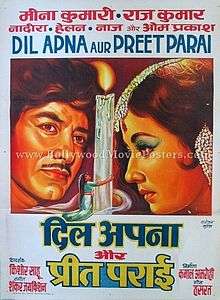Dil Apna Aur Preet Parai
| Dil Apna Aur Preet Parai | |
|---|---|
 Theatrical release poster | |
| दिल अपना और प्रीत पराई | |
| Directed by | Kishore Sahu |
| Produced by | Kamal Amrohi |
| Written by |
Kishore Sahu Madhusudan (supervising writer) |
| Starring |
Raaj Kumar Meena Kumari Nadira |
| Music by |
Shankar Jaikishan Shailendra (lyrics) Hasrat Jaipuri (lyrics) |
| Cinematography | Josef Wirsching |
| Edited by | Kantilal B. Shukla |
Production company |
Mahal Pictures |
Release dates | 1960 |
Running time | 155 min |
| Country | India |
| Language | Hindi |
Dil Apna Aur Preet Parai is a 1960 Hindi romantic drama film produced by S. A. Bagar. It is written and directed by Kishore Sahu. The film stars Raaj Kumar, Meena Kumari and Nadira as leads. The film tells the story of a surgeon is obligated to marry the daughter of a family friend, while he is love with a colleague nurse, played Meena Kumari. It is one of the noted acting performances of lead actress Meena Kumari's career. [1]
The films music is by Shankar Jaikishan, and features hit song, the Hawaiin-themed "Ajeeb Dastan Hai Yeh" sung by Lata Mangeshkar.[2] At the 1961 Filmfare Awards it created an upset by beating popular musical epic, Mughal-e-Azam of Naushad for the Best Music Director category. [3]
Plot
Sushil Verma (Raaj Kumar) is a surgeon in the Shimla Hospital. He lives on the hospital grounds in a doctor's house with his ageing mother and younger sister Munni (Kumari Naaz). Sushil's father died and his father's close friend paid for his medical school fees, thus creating a debt that Sushil's mother feels needs to be fulfilled.
Karuna (Meena Kumari) is a nurse who comes to the Shimla hospital and first encounters Dr. Verma during an emergency surgery. Both are clearly besotted with each other, but keep their feelings restrained.
By chance, on a nurses' beach day trip, Karuna meets Munni, who injures herself whilst playing. She takes Munni back to her house, not knowing that she is Dr. Verma's sister, and the house she is visiting belongs to him. She dresses Munni's wounds, sees how much work needs to be done in the house, and the fact that his mother is too ill to attend household tasks. She immediately steps in and fulfills the duties of the housewife; cooking, cleaning and taking care of everyone. Sushil comes home to see this and falls even more in love.
However, later on his mother organises a trip to Kashmir for the whole family, and conveniently guilt trips Sushil to marry Kusum (Nadira), the daughter of the man who paid for his medical school fees.
They come back to Shimla, and Karuna is devastated when she finds this out. Although she manages to conceal this for a while, situations keep arising and Kusum soon gets jealous of Sushil's preference for Karuna, and her perceived ill-treatment. Kusum manipulates and mistreats her mother-in-law and sister-in-law, until Sushil orders her out of the house. She goes back to Kashmir.
Dr. Verma's mother then realises her mistake and should have gotten him married to Karuna.
To avoid scandal Karuna moves to another hospital. But Kusum seeks to enact revenge on her. Dr. Verma finds this out and tries to beat Kusum to Karuna, which yields a cliff top high speed car chase, resulting in Kusum's death. The film concludes with reunion of Karuna and Sushil.
Cast
- Raaj Kumar as Dr. Sushil K. Verma
- Meena Kumari as Karuna
- Nadira as Kusum
- Ruby Myers as Head Nurse
- Tun Tun as Haseena
- Helen as Cabaret Dancer
- Om Prakash as Girdhari
- Shammi as Sheela
- Kumari Naaz as Munni
- Pratima Devi as Mrs. K. Verma (as Protima Devi)
- Edwina as Nurse Rosie
Soundtrack
All music composed by Shankar Jaikishan.
| No. | Title | Lyrics | Singer(s) | Length |
|---|---|---|---|---|
| 1. | "Ajeeb Dastan Hai Yeh" | Shailendra | Lata Mangeshkar | |
| 2. | "Andaz Mera Mastana" | Shailendra | Lata Mangeshkar | |
| 3. | "Dil Apna Aur Preet Parai" | Shailendra | Lata Mangeshkar | |
| 4. | "Itni Badi Mehfil" | Hasrat Jaipuri | Asha Bhosle | |
| 5. | "Jane Kahan Gai" | Shailendra | Mohammed Rafi | |
| 6. | "Mera Dil Ab Tera Ho Sajna" | Shailendra | Lata Mangeshkar | |
| 7. | "Sheesha-E-Dil Na Itna Uchhalo" | Hasrat Jaipuri | Lata Mangeshkar |
Awards
See also
References
- ↑ Hameeduddin Mahmood (1974). The kaleidoscope of Indian cinema. Affiliated East-West Press. p. 213.
- ↑ Pradeep Thakur. Indian Music Masters of Our Times- i. Lulu. p. 47. ISBN 978-81-908705-6-6.
- ↑ The Illustrated Weekly of India. October 1988. p. 53.
External links
Dil Apna Aur Preet Parai at the Internet Movie Database